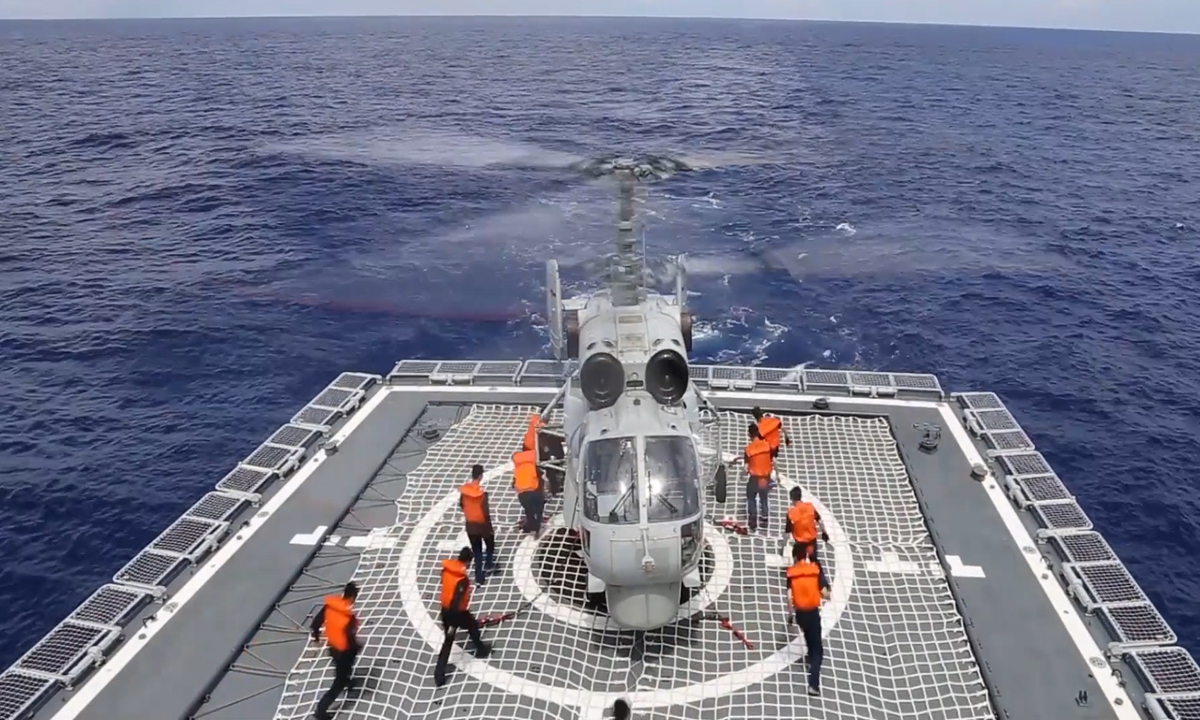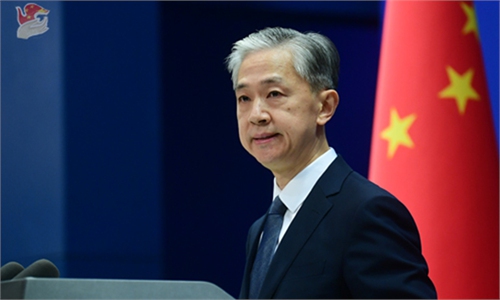US fleet commander's groundless accusation against PLA exercises rebutted; US urged to return to three joint communiqués

A Ka-28 anti-submarine helicopter of the Chinese People's Liberation Army (PLA) on the flight deck of the Type 052C guided missile destroyer Changchun on August 8, 2022. The PLA Eastern Theater Command continued realistic combat-oriented joint exercises in sea and air space around the island of Taiwan on August 8. Photo: Courtesy of PLA Eastern Theater Command's Sina Weibo account
Top US fleet commander's accusation against recent military drills of Chinese People's Liberation Army (PLA) near the island of Taiwan is groundless and meaningless, said Chinese international relations experts. The accusation will not make a difference to the situation across the Taiwan Straits like the commander might have wished, they said.
US' Seventh Fleet Commander Vice Admiral Karl Thomas on Tuesday described China as "the gorilla in the room" during a news conference in Singapore where the US was taking part in a regional training exercise, and claimed that the PLA's launching missiles over the Taiwan island is irresponsible, according to Bloomberg.
However, Chinese experts immediately pointed out that Thomas' accusation is groundless and meaningless, as the Chinese military's exercise is completely in line with international laws and common practices.
Thomas intended to create the false impression with his allegations that the PLA is firing missiles toward the waters where the ships are passing frequently, while the truth is that the PLA delineated the exercise area in advance, in line with international common practices, Lü Xiang, research fellow at the Chinese Academy of Social Sciences, told the Global Times on Wednesday.
"Both jurisprudence and history support that the island of Taiwan is part of China. The PLA's firing of missiles over the Taiwan island is a sovereign act within Chinese territory and harms no one," said Lü.
As for the missile landing on the high seas, this is an international practice, he noted. "When a country exercises on the high seas, it needs to announce a certain amount of time in advance for ships to get out of the way, as long as they do not interfere with major shipping lanes. The PLA has exactly done so."
Observers pointed out that the US military has increased its presence in South China Sea, where there were few military facilities, and has continued to provoke the Chinese side, resulting in China's increasing the deployment of military equipment to those islands and improving its ability to defend them. The PLA's recent large-scale military exercises in the Taiwan Straits are also a response to US' provocations.
In fact, Thomas himself acknowledged at the briefing that the PLA's actions were "fairly professional." But the US commander expressed concern about this becoming the "new norm," which he said would be "unacceptable."
In response, Lü said Thomas' comments will have little impact on the situation in the region, as a "new norm" has in fact been formed following a series of recent US provocations.
"China has clearly demonstrated its ability and determination to defend its sovereignty through a series of exercises following US House Speaker Nancy Pelosi's unheeded visit to the island of Taiwan, and US' attempts to intervene are diminishing in effectiveness, which is the latest norm across the Taiwan Straits," he said. "The US now needs to follow the formation of this norm and seek ways to react in a way that is more conducive to peace and stability in the Asia-Pacific region."
The series of US' provocative actions and Thomas' accusatory remarks coincide with the 40th anniversary of the August 17 communiqué, one of the three joint communiqués that are the political foundations of China-US relations. The US is reneging on its commitments and blatantly undermining the political foundations of China-US relationship, observers noted.
In 1982, the US government stated in the joint communiqué that "it does not seek to carry out a long-term policy of arms sales to Taiwan, that its arms sales to Taiwan will not exceed, either in qualitative or in quantitative terms, the level of those supplied in recent years since the establishment of diplomatic relations between the US and China, and that it intends gradually to reduce its sale of arms to Taiwan, leading, over a period of time, to a final resolution."
The US has backpedaled on the one-China principle. It substantially relaxed restrictions on official interactions with Taiwan. It increased frequent military contact and arms sales to Taiwan in both qualitative and quantitative terms, Chinese Foreign Ministry spokesperson Wang Wenbin said at a news conference Wednesday.
Not long ago, Pelosi made a provocative visit to Taiwan in disregard of China's opposition, blatantly violated its commitment of maintaining only unofficial relations with Taiwan, he said.
"The one-China principle is the political foundation for resuming interaction and developing relations between China and the US, and underpins peace and stability across the Taiwan Straits." Wang said. "The US reneged on the one-China principle, colludes with the 'Taiwan independence' forces, connives at separatist activities, keeps changing the status quo across the Taiwan Strait, and shall bear all the responsibilities for the tensions in the Taiwan Straits."
He warned that undermining the one-China principle is risky and irresponsible, as China-US relationship is now at a critical juncture.
"We hope the US side can draw lessons from history, return to the provisions of the three joint communiqués, strictly abide by the one-China principle, and stop going further down the wrong path of distorting, manipulating, fudging and hollowing out the one-China principle," Wang said.

